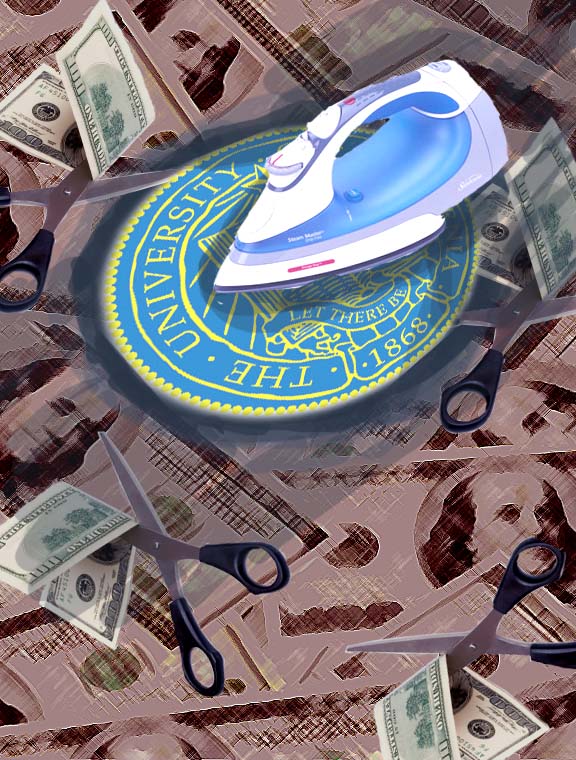
Daniel J.B. Mitchell
Professor Emeritus, UCLA Anderson School of Management and UCLA School of Public Affairs

Christian Haesemeyer
Associate Professor of Mathematics

Patricia Gándara
Professor at GSE&IS and Co-Director of Civil Rights Project
By Patricia Gándara
Gov. Jerry Brown’s proposed budget has put Californians on notice that they cannot have their cake and eat it too.
Californians have repeatedly demonstrated that they do not want to pay for the society they want to live in. Earlier generations of Californians supported K-12 and higher education systems that were widely viewed as among the best in the nation; good schools and universities were a major draw for smart, talented people.
However, with the chronic underfunding of education since that time, the quality of our schools has become a liability in recruiting talent to the state. Up to now, the University of California has maintained its world class reputation, but as we have seen with our K-12 schools, it too can go from first to worst with lack of state support.
Californians must understand that they created this scenario when in 1978 they voted for Proposition 13, slashing property taxes for both residents and businesses. The impact was immediate, devastating, and we have been living with smoke and mirrors budgets ever since. Everyone in political circles has known we have simply been forestalling the inevitable.
The proposed cut of $500 million from the UC ““ 13 percent of its state general revenue appropriation ““ will almost certainly require it to shrink, and UCLA will probably weather the biggest cut because it receives more state funding than other campuses.
As UC President Mark Yudof says, we are now “digging deep into the bone.” We aren’t likely to see a recovery of those funds any time soon.
Inequity in the higher education system will certainly grow. California State Universities and the community colleges will need to take more turned away UC students, but will not have the capacity to absorb them. They, too, are being cut mercilessly.
This budget proposal, which is bad enough, is predicated on some Republican support of a June ballot measure to increase taxes. If this does not happen, California and higher education have their best days behind them. Every UC student should be organizing now for that June vote.
By Christian Haesemeyer
The governor is proposing renewed cuts to higher education, to welfare, to health services. The UC administration will likely implement this in such a way that students’ education is further deteriorated, after massive fee increases over the last two years.
We are told that “there is no alternative.” We are told we need to be realistic. But the realities that preclude alternatives are not laws of nature; they lie in the way our society, economy and polity are structured. And they can be changed.
Thermodynamics doesn’t say that banks need to be bailed out by working people so the very few can have billions in bonuses, while states and localities must “live within their means.” It’s a political decision.
It is not a consequence of quantum mechanics that the state, in turn, decides to make up the budget deficit on the back of the poor and middle class, of public employees and those who need help ““ it is a reflection of where the power in our capitalist society lies (hint: it isn’t with the workers).
Newton’s laws of mechanics do not imply that the UC system has to spend money on new lab buildings that are a subsidy by students, their parents and taxpayers for corporate research. If it weren’t for the way neoliberal capitalism has transformed the university, it might as well be spent on instruction, on research to benefit all of us, on fair wages for all who work here, and on rescinding the fee hikes.
All this is not to say that social realities are any less real than the solar system. But they can be changed, by us (try that to the solar system ““ or better yet, don’t).We ““ the overwhelming majority of the people of California and anywhere ““ can organize ourselves to create a world where education is really free in every sense of the word.
We can start by refusing to accept the rhetoric of inevitability. We can follow the example of the people of France, of Greece, of Tunisia and say “Enough!”
We may fail this time, but even if we do we will learn how to succeed in the future.
By Daniel J.B. Mitchell
The state of California cannot afford the University of California. Correction: The state of California ”“ given its political institutions and voter frame of mind ““ does not want to afford the University of California.
Indeed, the 1960 Master Plan for Higher Education ““ which offered a virtually free college education to any Californian who wanted one ““ has been eroding since it was written and is essentially dead. The erosion mirrors the fiscal condition of the state, which particularly deteriorated after the Cold War ended around 1990 and the state stopped receiving the major injection of federal military spending that initially began with World War II.
Moreover, the University of California is quite a different institution from what it was in 1960 when the Master Plan was drawn up and the Cold War was in full swing.
The UC is now a huge multi-campus operation with a budget of about $20 billion. About an eighth of that budget comes from the state. The rest comes from research grants, hospital revenues, tuition and various miscellaneous sources.
So when someone raises the controversial word “privatization” in the context of the UC, keep in mind that it is already seven-eighths privatized.
However, under current arrangements, the one-eighth piece from the state is disproportionately important ““ since it finances certain operations critical to providing the basic education mission of the university. The UC cannot divert dollars received for someone’s chemotherapy to pay the phone bill of the English department.
It cannot take money contracted to perform a particular research project and instead use it for general educational purposes. So the one-eighth is the tail that wags the dog.
There is good news and bad news in the constitutional position of the university. The UC Board of Regents has legal autonomy and is supposed to insulate the UC from the larger political process. That’s the good news. But the bad news is that this arrangement has in practice cast the university as a villain during state budget crises. How does that happen?
Essentially, the regents end up in a reactive mode. The state first takes away money and the regents then respond by raising tuition to offset the loss. State legislators ““ who voted for the takeaway ““ feel free to complain that the regents are at fault.
Student groups and labor organizations hold angry demonstrations at regents meetings. All of this activity is an obvious denial of cause-and-effect. The UC is in a lose-lose situation that needs to change ““ soon.
What has long been required is a deal between the university (as represented by the regents and the UC president), the governor, the legislature and the various key “special interests” in the state on the future of UC. But it has to be a real deal. All the key players must be involved.
Shortly after Gov. Arnold Schwarzenegger took office in the recall election of 2003, the UC did make a “compact” with the new governor. But it was worthless and, indeed, harmful since it created the illusion of a real deal.
The compact did not include the legislature or key interest groups. It produced no funding that the UC would not have received in any case. It was part of a larger arrangement that involved the CSU, which has a very different funding system and does not have the budget options that the UC has.
And it was a fair-weather accord. As soon as the budget outlook became cloudy, the terms of the compact were ignored by the governor. Since the legislature was never a part of the compact, it had absolutely no weight there when budgets were enacted.
In various forums, including testimony on the Master Plan before the state legislature, former UCLA Chancellor Charles Young has called for a real deal between the UC and the state. So have others.
Such a deal would, in broad outlines, follow what is sometimes termed the “Michigan Model,” so named after an arrangement in Michigan that restructured the relationship between that state and its university. In essence, the deal would provide access guarantees for California residents, raise the sticker price for tuition (particularly for out-of-state residents), and redistribute the resulting funding toward subsidizing students who most needed it.
The regents would no longer be in a reactive mode. Everyone would understand the implications of reduced state funding.
We can shed tears for the fate of the Master Plan. We can pretend that demonstrations at regents meetings will somehow generate dollars for the UC. We can ignore a half century of history since the Master Plan was written.
Or we can press the UC president and the regents to start working on a real deal with the state. That is the choice.
